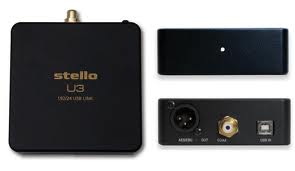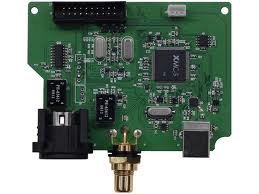by Kevin OBrien on December 21, 2012
APRIL MUSIC STELLO U3 SPDIF CONVERTER REVIEW
***UPDATE 03/22/2013***
***v1.61 Thesycon USB Drivers & Updated Firmware Available Now!!!***
~~~~~~~~~~~~~~~~~~~~~~~
***Click here to download!!!!***
~~~~~~~~~~~~~~~~~~~~~~~
Install Instructions:
1.) Download and Extract Software Installer
2.) Update Firmware via TUSB Control Panel
3.) Uninstall v1.22 Thesycon USB Drivers
4.) Install NEW v1.61 Thesycon USB Drivers
***This update should fix the main issues we've experienced with the Stello U3's performance such as drop-outs, etc... This install should eliminate these problems!!! We will report back after our testing is complete which is currently in progress...***
----------------------------------------------------------------------------------------------------------------------------------------------------------------------------------------------------------------------------------------------------------------------------------------------------------------------------
We got a hold of an April Music Stello U3 USB to SPDIF converter and we ran it through the paces. Turns out, it's a nice little unit and it sounds good too. We're here to tell you that if you can get it dialed in, you'll be rewarded with a great sounding SPDIF converter that's really convenient to use.
April Music is out of Korea and they are the makers of the popular Eximus DP1 USB DAC/ Headphone Amp/ Preamp that everyone is raving about. We were able to hear the Eximus DP1 at this year's RMAF 2012 and we were impressed. We heard about the little Stello U3 from 6Moons and other online forums so we were pretty excited to audition the little black box everybody's talking about.

The Stello U3 utilizes the XMOS input chip and uses the 5V from the USB cable to power itself. There is no power supply or wall wart to plug into which makes it convenient to use but also degrades its performance in our eyes. A cool project would be to add an external power supply to the Stello U3 and take it to the next level. Maybe we'll tackle the challenge in the next few months.
UPDATE: We did end up coming up with a solution to the USB bus power problem. The answer is here. We developed a dual-headed USB cable with a data head and a power head. The data head plugs into our server and the power head plugs into our YFS 5V DC power supply. It's the perfect USB power solution and a great way to boost your DAC's performance.
You get a Coax and an XLR digital output and your standard USB input on the rear of the U3. We could not discern a real difference between Coax and the XLR digital output but some folks are convinced that the XLR provides a better connection. As far as jitter goes, we agree so that's what we ended up using.
We installed the drivers from the manufacturer's website and the unit was recognized by our Windows 7 based HD.Ref-3 server with no problems. The U3 uses the Thesycon drivers that all other XMOS units use. We like the Thesycon USB drivers as they have ASIO drivers embedded within them which makes setup a breeze in most cases. The Stello U3 proved to be one of the exceptions to the rule. We were unable to get our U3 to play without at least some very tiny hiccups. We experienced a pop or blip every now and again with no way to alleviate the issue no matter what settings we played with. We did upgrade the firmware with the latest version on April Music's website and still no help. We've heard April Music is coming out with another driver version with updated firmware so this may allow the U3 to behave somewhat better in the near future. We're sure hoping so because if we could get this sucker to play nice, we'd definitely be game for adding a power supply to the unit.

The sound we got after 3 weeks of break-in was really nice. The Stello U3 falls between the M2Tech EVO and the Berkeley Audio Alpha USB. In general, the U3 has great resolution and great bass. We noticed the EVO, which was hooked up to our custom 9V DC linear power supply, had more laid back highs but more mid range and bass punch than the Stello U3. The Stello U3 had very similar highs to the Alpha USB but the Alpha had more punch in the bass region. As you're probably noticing all these units sound great, just a little different from one another. Depending on your system, you may prefer one unit to another.
More importantly, we wanted to let our readers know that we had a little trouble getting the U3 to behave with the SOtM USB card in our Ref-3 SE server. We haven't been able to completely get rid of pops but we've been able to keep them at a minimum. We're not sure why we cannot get the unit to work perfectly? Our other SPDIF converters work fine so we can't figure out why the Stello U3 doesn't want to play nice. And yes, we used JRiver, Foobar 2000, as well as Album Player and they all had similar issues with playback.
We're fairly positive these issues mentioned above will be ironed out but for now, we're still scratching our heads on this one.
UPDATE: We played the Stello U3 for 3 days straight with the updated firmware and the new v1.61 Thesycon drivers and most of our problems went away. The data streams smoothly no matter which bit-rate we're playing. The real bonus is that it streams 24.192 data to our EE Minimax DAC Plus now without a hitch! We will continue to test the Stello U3 and make more observations in the future if necessary. We've heard one "pop" so far and that's 4 days into our testing. Finally, now this U3 device is a real winner. :-)
If you're wondering if you can keep your favorite DAC and still use your computer as a transport, the answer is yes. Give a few SPDIF converters a shot and see which units are best for your personal system. As we've stated before, we've found no ill effects by adding a USB to SPDIF converter to the chain of source components in our system, just a small change in overall balance and presentation which is why we love this hobby!
-YFS Design Team
Associated Equipment:
- YFS HD Ref-3 SE Music Server Transport
- YFS Custom Ca-60 Preamp
- Bricasti Design M1 USB DAC
- McIntosh MC275 MkV Amplifiers (in mono configuration)
- Von Schweikert VR-44 Aktive Speakers
- PS Audio Power Plant Premier (one for each monoblock)
- Equitech 1.5Q Balanced Power Isolation Transformer (used for source components)
- YFS Cabling and Interconnects
